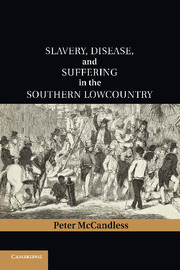Description
Slavery, Disease, and Suffering in the Southern Lowcountry
Cambridge Studies on the American South Series
Author: McCandless Peter
Explores how disease and human responses to it influenced the South and the United States.
Language: English
Subject for Slavery, Disease, and Suffering in the Southern Lowcountry:
Approximative price 39.35 €
In Print (Delivery period: 14 days).
Add to cart
Slavery, Disease, and Suffering in the Southern Lowcountry
Publication date: 01-2014
Support: Print on demand
Publication date: 01-2014
Support: Print on demand
Approximative price 92.03 €
In Print (Delivery period: 14 days).
Add to cart
Slavery, disease, and suffering in the southern lowcountry
Publication date: 04-2011
324 p. · 15.2x22.9 cm · Hardback
Publication date: 04-2011
324 p. · 15.2x22.9 cm · Hardback
Description
/li>Contents
/li>Biography
/li>
On the eve of the Revolution, the Carolina lowcountry was the wealthiest and unhealthiest region in British North America. Slavery, Disease, and Suffering in the Southern Lowcountry argues that the two were intimately connected: both resulted largely from the dominance of rice cultivation on plantations using imported African slave labor. This development began in the coastal lands near Charleston, South Carolina, around the end of the seventeenth century. Rice plantations spread north to the Cape Fear region of North Carolina and south to Georgia and northeast Florida in the late colonial period. The book examines perceptions and realities of the lowcountry disease environment; how the lowcountry became notorious for its 'tropical' fevers, notably malaria and yellow fever; how people combated, avoided or perversely denied the suffering they caused; and how diseases and human responses to them influenced not only the lowcountry and the South, but the United States, even helping to secure American independence.
Part I. Talk about Suffering: 1. Rhetoric and reality; 2. From paradise to hospital; 3. 'A scene of diseases'; 4. Wooden horse; 5. Revolutionary fever; 6. Stranger's disease; 7. 'A merciful provision of the creator'; Part II. Combating Pestilence: 8. 'I wish that I had studied physick'; 9. 'I know nothing of this disease'; 10. Providence, prudence, and patience; 11. Buying the smallpox; 12. Commerce, contagion, and cleanliness; 13. A migratory species; 14. Melancholy.
Peter McCandless received his Ph.D. in Modern British and African History from the University of Wisconsin in 1974 and joined the history faculty of the College of Charleston that year. He received the college's Distinguished Teaching Award in 1985 and was named a Governor's Distinguished Professor in 1998. He is the author of Moonlight, Magnolias, and Madness: Insanity in South Carolina from the Colonial to the Progressive Eras (1996) and numerous journal articles.
© 2024 LAVOISIER S.A.S.




